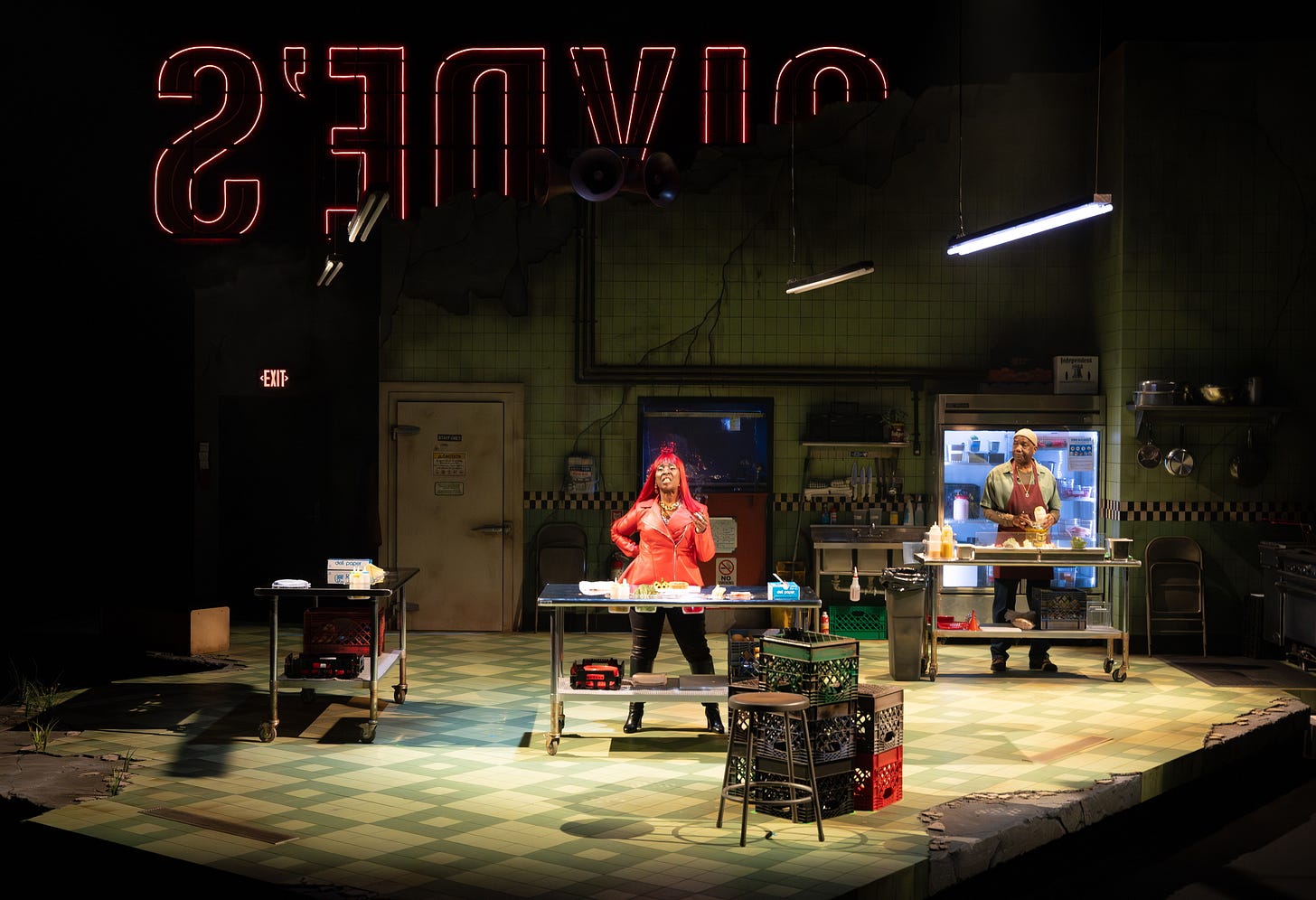Through March 3: Sharp, Savory, and Satisfying—The Rep’s “Clyde’s” is a Theatrical Delight
A vision of hope—one that is messy, imperfect, and hard-won.
When is a sandwich something more than just a sandwich?
When it is, as the character Montrellous observes, “…the most democratic of all foods. Two pieces of bread, and between, you can put anything you want. It invites invention and collaboration.”
Montrellous is one of five characters in “Clyde’s,” an ensemble play by two-time Pulitzer Prize-winning playwright Lynn Nottage. Known for her incisive, socially conscious storytelling, Nottage crafts dramas that explore race, class and resilience with humor and humanity. Now on stage, The Repertory Theatre of St. Louis’ production of “Clyde’s” transforms the simple sandwich into a rich, multi-layered, beguiling metaphor for creativity and personal expression for a group of ex-cons working hard not to become recidivists.
While Nottage’s metaphors can be overt—the sandwich as a symbol of opportunity, of America’s broken systems, of second chances—the script’s humor and heart prevent it from feeling heavy-handed. Under the sharp direction of Josiah Davis, the Rep’s production hums with energy, humor and pathos, and offers a fresh take on themes of redemption, resilience and the search for meaning. The rapid-fire dialogue and meticulously choreographed kitchen movements, under Davis’ expert direction, make for a brisk and engaging 95-ish minutes (without intermission). The take-out on this “Clyde’s” is that it is a dish best served live—and one that should not be missed.
There’s the old advice to never go grocery shopping when you’re hungry, and the same applies to attending “Clyde’s.” In addition to the constant references to some awesome-sounding sandwiches, scenic designer Jean Kim’s set is so realistic that you can almost smell the bread baking. The set is a character with which the characters believably interact.
Set in a rundown truck-stop diner, “Clyde’s” revolves around a group of ex-convicts striving for a second chance while working under the tyrannical rule of Clyde, played with fiery, tangy bravado by Phyllis Yvonne Stickney. Clyde is initially reminiscent of the sassy character Flo in the 70s sitcom “Alice.” Flo’s famous catchphrase was “Kiss my grits!” Clyde would add an expletive before grits before evolving into a much harsher character – with a murky present and even murkier past – who doesn’t have a catchphrase.
Clyde could easily be overplayed, ala Flo, but Stickney never succumbs to that fault. She maintains her character’s iron fist (and genital-grabbing) management style while delivering lines that range from abusive to zestily zingy -- “You think Colonel Sanders didn’t fry up a couple of rats to make ends meet?”
Her kitchen staff, however, finds solace and meaning in crafting the perfect sandwich—a pursuit that becomes a metaphor for their own personal growth. Ron Himes delivers a quietly powerful performance as Montrellous, the philosophical, sensei chef who believes sandwiches can be an act of art, even salvation. Himes exudes Zen-like wisdom, and his delivery resonates deeply as he encourages his fellow cooks to find creativity and pride in their work – just as he has.
Alfredo Antillon’s Rafael is a romantic with a checkered past. His crime? Robbing a bank with a BB gun—comically absurd yet tinged with desperation. Antillon’s performance deftly emphasizes his character’s charm, impulsiveness and vulnerability – especially impressive as he captures Rafael’s romantic, naive nature.
Essence Anisa Tyler’s excellent and nuanced portrayal of Letitia (Tish) is notable for her ability to skillfully balance her character’s tough, street-smart exterior with moments of touching vulnerability – especially as she reveals her backstory of stealing medication for her daughter with a serious medical condition. Tyler’s sharp, fast-paced delivery and introspective pauses reveal an impressive flexibility and emotional depth. Through dynamic physicality, such as twerking to highlight her confidence and playfulness, Tyler showcases Tish’s resilience and fierce determination to rebuild her life.
Brendan D. Hickey’s Jason, with arms covered in white supremacist tattoos, undergoes a significant transformation, shifting from a person defined by his past mistakes to someone seeking redemption and self-worth. Hickey’s performance is notable for his ability portray Jason as initially defensive and withdrawn and then soften to touchingly reveal his more vulnerable side. Hickey is particularly adept at portraying subtle changes in Jason’s demeanor, paired with shifts in tone and delivery – particularly through his evolving relationship with food and his role in the kitchen.
As Clyde torments her employees with relentless insults and unpredictable mood swings, they find themselves increasingly drawn to Montrellous’ vision of sandwiches as something more than sustenance. This pursuit transforms the play into a meditation on self-worth and purpose, even as they each leave the diner in search of their own destinies.
Despite its comedic exterior, "Clyde’s" never loses sight of the real struggles its characters face. The play acknowledges the systemic barriers that make reintegration difficult for former convicts while refusing to wallow in despair. Instead, it offers a vision of hope—one that is messy, imperfect, and hard-won.
No spoilers here, but the play’s highly dramatic final moment deserves notice. While at first it might seem out of place, it is a necessary jolt that aims to ensure that Clyde herself is remembered for her less-than-noble treatments of the cooks in her hellish kitchen and not as much for her funny, biting bon mots. Clyde deserves to ultimately be less a friend and more of a systematic hindrance to the iron chefs slicing, dicing and dancing in her kitchen.
The Repertory Theatre of St. Louis’ “Clyde’s” plays February 5 through March 3 at the Loretto-Hilton Center. See the website for more information.




